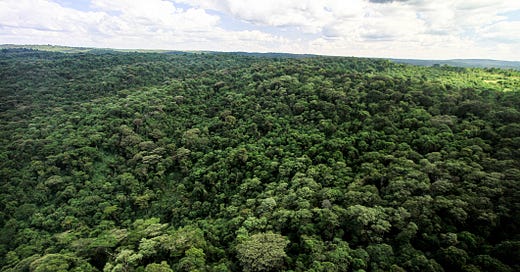Ruto’s carbon dream is a nightmare for the people of the forest
Forced migration looms over the Ogiek people as Western conservationists and Middle Eastern carbon credit traders seize Kenya’s forests
David Soler Crespo in Sasimwani
Peter Meikobi has been warned he shouldn’t be here anymore. But he has nowhere else to go. In November, rangers burned down 200 households in Sasimwani, including his family home. Meikobi was not told why this was done.
“They spoke the language of axe and fire.”
Getting there involves careful planning and co-ordination to avoid the rangers in this part of the Mau forest in Kenya’s south-west. The Continent joins him for the walk and, after about an hour, we get to his family home. His dad’s house is shattered; his brother’s burnt to ashes.
Minutes after our arrival, a forest ranger shows up and asks us to leave. The ask is polite, which surprises Meikobi.
There is of course a reason: “He’s afraid of you because you’re a muzungu [white person]. If you weren’t here he would have beaten us out.”
The Ogiek are a small hunter-gatherer community. The Kenyan government put their population at about 79,000 a decade ago. More recent estimates by rights organisation Amnesty International put the number at 20,000 – with 75% living in the Mau forest.
Last October, Kenyan President William Ruto ordered that “encroachers” be removed from the forest, to protect it because it is the biggest water catchment ecosystem in the country. “Those in the forest should get out immediately as we are putting up a fence. It is not a request.”
When rangers used that order to burn Ogiek homes, they defied two rulings of the African Court. One in 2017, which recognised Mau forest as Ogiek ancestral land, and another in 2022 that ordered the Kenyan government to pay reparations to the community for harming them in earlier evictions in 2009.
The carbon credits hustle
During the first Africa Climate Summit in September, Ruto made it clear that he sees climate change as a business opportunity.
“We must see in green growth not just a climate imperative, but also a fountain of multibillion-dollar economic opportunities that Africa and the world is primed to capitalise on.”
The next month, Dubai-based firm Blue Carbon LLC said it had signed a carbon credits agreement with Kenya for “millions of hectares”. It is unclear if those include the Mau forest – the official document hasn’t been made public and neither party responded to questions.
But Ruto issued his eviction three weeks before the Dubai firm’s announcement.
Alex Kisioi, a member of the Ogiek Peoples’ Development Programme, suspects their current eviction is linked to carbon credits. “We are not forest offenders, we are custodians. They accuse us because of the carbon credits.”
Founded by a member of the ruling United Arab Emirates royal family, Sheikh Ahmed Dalmook Al Maktoum, Blue Carbon has existed for barely a year and has no track record in conservation.

But it already controls an area larger than the United Kingdom, including a fifth of Zimbabwe, a tenth of Liberia and Zambia and large tracts of Tanzania, having sold the political class on its carbon credits business model.
It’s far from the only capitalist interest on indigenous lands. Sasimwani village is inside the 60,000 hectares claimed by Dutch firm IDH, which says it works with tea plantations to conserve the Mau forest.
Kisioi finds the idea of evicting the Ogiek to conserve the forest nonsensical.
“We are the forest. It’s like taking fish from the water.”




